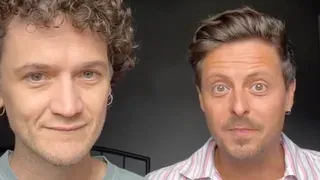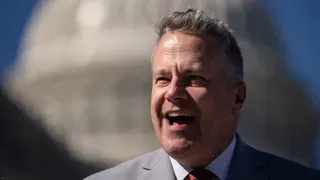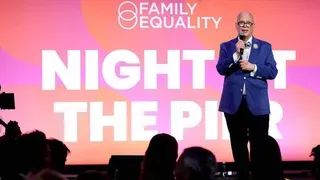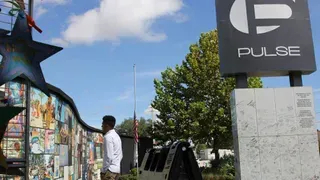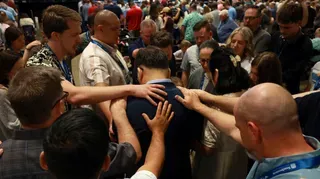January 30, 2013
LGBT Millennials Start to Think about Aging
Chris Sosa READ TIME: 4 MIN.
Tom Temprano believes in an anti-ageist LGBT community that recognizes the needs of the elderly, but it wasn't until he broke a tiny bone in his foot during a heated basketball game that he experienced first-hand the limitations that come with age.
The gay 26-year-old found himself debilitated for nearly four months and fostered the same sort of community among friends, partners, and resources that the elderly experience.
For the growing population of younger, millennial LGBT individuals largely self-employed and without jobs with 401k packages, the future often seems hazy - that is, if it's even considered.
"My injury got me more concerned as I see those around me aging and I want to make sure everyone has access to health care," said Temprano, who last week was elected president of the Harvey Milk LGBT Democratic Club.
He estimates his 401k from a previous job at a nonprofit entrepreneurial center at $800, and it hasn't increased due to his self-employment as a promoter and marketing consultant.
Among those under 30 who were interviewed, uncertainty loomed when asked, "What will you do when you retire?" or, "Who will decide your end of life care?"
Even greater, simpler, and more personal was the question, "Do you want to have kids?"
"I'm interested in my education so I can get a career so I can have a family. I don't know which one will come first though. By the time I'm in my mid-30s though, definitely," said Darren Girard, 25, a transgender man and recent graduate of City College of San Francisco.
Among young LGBT people, preparation for aging - whether it's financial or more personal - doesn't seem necessary until it happens.
"Personally, I'm single, but if I had a partner I'd make those wills and put money aside to prepare for those taxes if they were the same way in the future," said Girard from his new home in Santa Ana, California.
And too often, the pace of life overshadows consideration for long-term planning when many LGBT millennials find themselves in a stale job economy mounted with student debt.
Angela Perone is a 31-year-old attorney with the National Center for Lesbian Rights, which was the first LGBT legal organization to start a permanent Elder Law Project to identify and assist the needs of an aging generation of baby boomers.
She works with aging issues and said it highlights gaps in policy work, including the Defense of Marriage Act, which prevents federal recognition of same-sex relationships for tax and other purposes.
A queer woman, Perone has been with her same-sex partner for six years, and she'd like to have children. But in the course of this maturation, she has recognized the complications that arise from aging as a lesbian.
"My partner and I have honest discussions and think about issues and steps to create documents in spite of legal barriers. We talk to other family members and friends. Do we want to be buried or cremated? Who do you not want there?" Perone said.
The policies that exist on a federal level, like Social Security benefits and estate tax and planning benefits, often leave same-sex couples who are near the end of their lives in exacerbated tragedies because of DOMA.
Jim Casey, president and CEO of Integrated Wealth Management, has slides that he uses to talk about how same-sex couples can plan their finances and assets. His comment for LGBT couples bleakly reflects the federal government's standpoint.
"In the eyes of the federal government, you're strangers," Casey said.
To avoid unexpected taxation upon a partner s death, LGBT millennials should keep their finances and property separate and to start saving now to offset the taxation on same-sex couples, Casey said.
The U.S. Supreme Court will hear a DOMA case in March. It involves Edie Windsor, 83, who married Thea Spyer, her partner of 44 years in Canada in 2007. Spyer died two years later. The federal government refused to recognize their marriage and taxed Windsor's inheritance from Spyer as though they were strangers. Under federal law, a spouse who dies can leave her assets, including the family home, to the other spouse without incurring estate taxes.
Casey warned that LGBT millennials shouldn't settle into lofty expectations of equality by the time they are elderly too.
"The only thing we can do is to make sure assets are handled by someone adept in the nuances of finances for same-sex couples," Casey said.
Among even younger millennials - those who are coming out of high school or in their early 20s, the question, "How are you preparing for old age?" holds the same uncertainty as, "What are you going to be when you grow up?"
Noah Miller, 34, executive director of outLoud Radio, works with student interns between the ages of 14 and 24 who produce short podcasts ranging from subjects like coming out to intergenerational storytelling.
"When I was growing up, you wore green on Thursday, that meant you were gay," Patty Woods, 58, said about growing up in New York during an interview with 20-year-old Cedar Lay.
OutLoud's Intergenerational Storytelling Project in collaboration with Openhouse, a housing, services and community organization for LGBT seniors, forges a connection between youth and elders and opens dialogue and reflection on aging.
"It's hard to put yourself in the shoes of someone 70 years older than you. But by the end, the students feel excited," Miller said.
He said that through this project, groundwork is being laid for LGBT youth to consider what life would be like in their old age.
It also uplifts LGBT seniors who may feel isolated or alienated as they grow older while providing LGBT youth with role models that they may have lacked while coming out.
"Very few have chances to forge this kind of relationship," Miller said.


